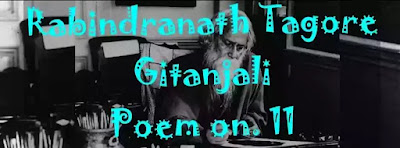Also Read
Leave this chanting and singing and telling of beads! Whom dost thou worship in this lonely dark corner of a temple with doors all shut? Open thine eyes and see thy God is not before thee!
He is there where the tiller is tilling the hard ground and where the path-maker is breaking stones. He is with them in sun and in shower, and his garment is covered with dust. Put off thy holy mantle and even like him come down on the dusty soil!
Deliverance? Where is this deliverance to be found? Our master himself has joyfully taken upon him the bonds of creation; he is bound with us all for ever.
Come out of thy meditations and leave aside thy flowers and incense!
What harm is there if thy clothes become tattered and stained? Meet him and stand by him in toil and in sweat of thy brow.
Summary
This lyric is basically a continuation in theme from the previous one. Tagore here says that God cannot be reached through the traditional forms of prayer and religious service. So leave chanting verses and prayers, and singing hymns of counting the beads of your rosary. God is not to be worshipped in a lonely dark corner of the temple with all the door closed shut. Open your eyes and you will see God is not there in that dark corner, the temple is empty.
God can be found rather among the farmers tilling the land, amongst the labourer who break stones to make roads. He dwells among them in the sun and in the rain and his clothes are as dusty with dust as theirs. Therefore, Tagore pleads of man that they should leave the mantle of holiness they have worn and seek God among the labourers and should work among them.
If man is looking for liberation and salvation, the question that is essential is where is this salvation to be found. God has joyfully and willingly taken all the responsibility of all creation and therefore, He dwells with human kind all the time. There is no need to find Him, He will find us.
Tagore calls upon man to leave these religious rituals and meditations, to leave praying to God by offering flowers and burning incense God will not look at the tattered and torn clothes or whether they are stained. Come to meet Him among the labourers and put in your hard work and toil.
Critical Analysis
In this lyric Tagore is harshly criticizing the traditional practices of Hinduism in offering prayers where devotees offer prayers by sitting in the temple and chanting shlokas and singing hymns or else by counting beads without rhyme and reason. Tagore condemns the men and women who stay thus in the temple seeking God because he feels that in reality God doesn't dwell in the dark corners of the temple but in the sun, among the labourers who toil every day. Therefore, instead of thinking that one can find God away from common life in the dark temples, man should come and toil and labour with the farmers and other workers.
Tagore finally condemns how Hindus seek salvation through meditation. He says that there is no need for attempting to attain salvation for God is with man all the time, He can only be found by working hard and eating the fruit of one's labour.
"Deliverance? Where is this deliverance to be found? Our master himself has joyfully taken upon him the bonds of creation; he is bound with us all for ever."
Tagore believes in the salvation through love but not in renunciation. The ascetics seek for deliverance or life. But says Tagore such a deliverance is mere illusion. God Himself is bound to all of us in chains of love. He himself is not free, as He has voluntarily bound Himself to work of creation and to the objects He has created. How can then man ever hope to be free from bondages? Deliverance is illusion the ascetic should follow the rules of creation and preter the humble duties of life. Tagore has no sympathy for those who give a slip to life. Tagore does not teach us the philosophy of negation or of barren renunciation but a realization completely comprehensive. He has placed faith in the kingdom of man on earth, rich with variety of human relationship.
Annotation
Chanting: the reading or the recitation of the shlokas and mantras, in a certain tune as a prayer to God. Telling of beads: turning the rosary round and round in order to keep track of number of prayers one has said. Holy mantle: the religious man's outer garment. Deliverance : the liberation of the soul. Bonds of creation: the responsibility of creation. Meditation: deep religious contemplation. Is sweat if thy brow: a phrase referring to hard toil and labour.
